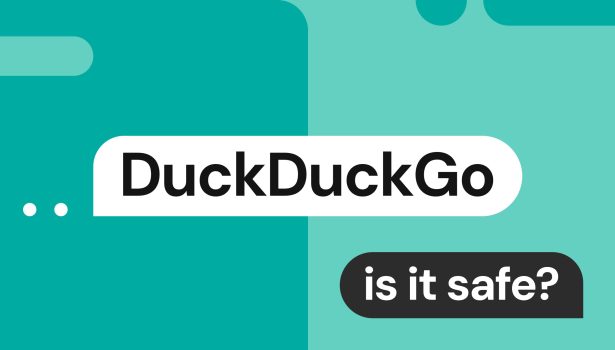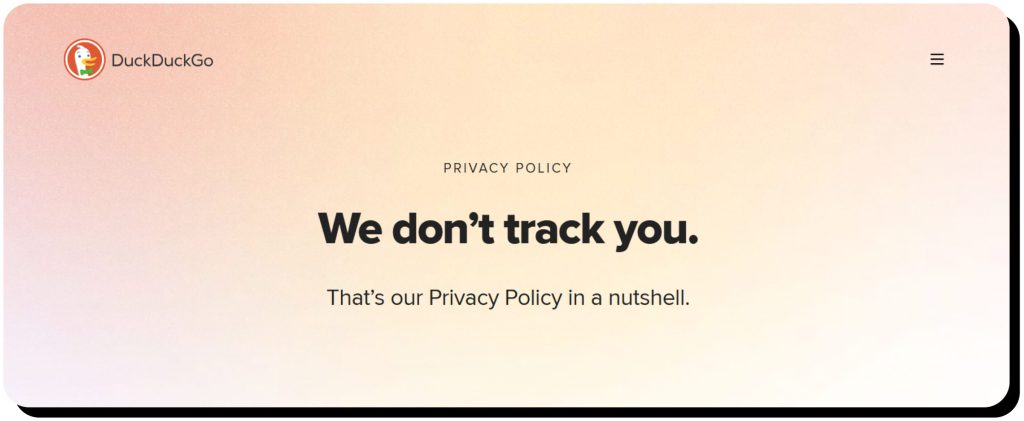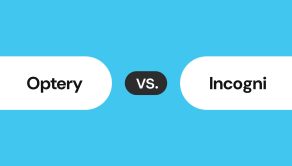Is DuckDuckGo safe? Everything you need to know in 2025

The internet is a massive storage of data—yours, ours, and the other 5.56 billion people who use the web. That storage is created not only by your social media posts and online shopping—it’s largely created through constant tracking by search engines and websites.
The DuckDuckGo search engine, however, helps reduce that tracking, offering a more private way to surf the web. Since 2008, it has become a solid alternative to Google, especially for those who care about protecting their personal data.
But is DuckDuckGo safe enough to switch to? With strong privacy features and a no-tracking policy, DuckDuckGo offers peace of mind, yet it does have its limitations.
Let’s break down how it works, who’s behind it, and where it stands in today’s digital world.
What Is DuckDuckGo?
DuckDuckGo is a search engine founded in 2008 and built to prioritize privacy. Unlike Google, which tracks your search history and online activity, DuckDuckGo doesn’t collect what you’re looking for or where you find it.
When you search with DuckDuckGo, your query isn’t connected to your personal identifiers. There’s no user profile created, no search history saved, and no data to sell to advertisers. This “search without being tracked” approach is the foundation of DuckDuckGo’s appeal.
Beyond its search engine, DuckDuckGo has expanded to offer a browser and a browser extension. These tools include additional privacy features like tracker blocking, forced HTTPS connections, and a “Privacy Grade” for websites you visit.
The company makes money primarily through non-targeted advertising based solely on what you’re searching for in the moment—not your past behavior or personal information. If you look up “hiking boots,” you might see a relevant ad, but it won’t follow you around the Internet for weeks.

Who owns DuckDuckGo?
DuckDuckGo was founded by Gabriel Weinberg, who remains the CEO today. The company is headquartered in Paoli, Pennsylvania, and operates as a private company (not a non-profit, as some assume).
The ownership structure also includes several investors who have provided funding over the years. In total, DuckDuckGo has raised over $170 million in funding through multiple investment rounds. The company’s last major funding round was in 2021 (Series B), when it raised $113 million.
Does outside investment compromise DuckDuckGo’s privacy mission? The company maintains that its business model of privacy-respecting advertising aligns investor incentives with user privacy. While Google and Facebook profit directly from invasive tracking, DuckDuckGo doesn’t need your personal data to generate revenue.
Is DuckDuckGo really private?
Does DuckDuckGo track you?
DuckDuckGo’s Privacy Policy is refreshingly simple compared to the novels of legalese from most tech companies. Here’s what the company doesn’t collect:
- Personal information
- Search history
- IP addresses
- Unique identifiers to link your searches together
- Browsing history if using their browser
However, DuckDuckGo does collect some information:
- Search terms, though anonymized (without tracking that you are the one who searched a specific term, but just the fact that the term was searched)
- Basic device information for functionality
- Aggregated, anonymized data about how people use their service
- App usage statistics for their mobile app and extension
This limited data collection helps improve their service without compromising individual privacy. For example, they might track that searches for “pizza recipes” are increasing, but they won’t know it was you who looked it up.
How anonymous search claims work
DuckDuckGo’s privacy works through several technical approaches:
First, they simply don’t save identifying information when you look something up. While Google assigns you a unique ID and builds a profile of your interests, DuckDuckGo doesn’t create user profiles at all.
Second, they use secure connections (HTTPS) by default, which encrypts traffic between your device and their servers. This prevents ISPs and network observers from seeing your search terms.
Third, when you click on a search result, DuckDuckGo uses a redirect that strips away information about your search before sending you to the destination website. This prevents the site you visit from knowing what you looked for to find them.
Is DuckDuckGo safe from hackers?
It’s important to understand that no platform or service is completely safe from hackers. However, DuckDuckGo implements various security measures to maintain its users’ privacy and avoid breaches.
Additionally, since DuckDuckGo doesn’t store personal data or create user profiles, there’s simply less valuable information for hackers to target in the first place. You can’t hack what doesn’t exist, and your search history doesn’t exist on DuckDuckGo’s servers.
Encryption
DuckDuckGo enforces HTTPS connections, which encrypt data between your device and their servers. This encryption makes it extremely difficult for hackers to intercept your search queries or results.
Additionally, their browser and mobile apps include forced HTTPS for all websites you land on when available, further protecting your browsing activity.
Keep in mind, though, that this encryption only protects data during transmission. Anything stored locally—like your activity history if using a usual browser—is still vulnerable if someone gains access to your device.
Can results be manipulated or tracked?
Search result manipulation is a concern for any search engine. DuckDuckGo sources most of its results from Microsoft Bing, with additional information from hundreds of sources, including Wikipedia, Apple Maps, and its own web crawler.
However, a big reliance on Bing creates both strengths and vulnerabilities:
- It provides comprehensive results without building a massive surveillance infrastructure
- It also means DuckDuckGo could inherit any manipulation that affects Bing
As for tracking within results, DuckDuckGo takes steps to prevent this by:
- Proxying images to prevent image-based tracking
- Using their own maps system rather than embedding Google Maps
- Removing URL tracking parameters when you click on results
Nevertheless, it’s crucial to understand that while DuckDuckGo strips out trackers and protects your privacy within the search interface, it can’t safeguard you from malicious websites, downloads, or phishing attempts. When you click a link or download a file, it’s your device and judgment that determine the ultimate safety.
DuckDuckGo’s browser vs. search engine
The DuckDuckGo browser is available for Windows, Mac, Android, and iOS, and goes beyond the security features of its search engine. It includes:
- Built-in tracker blocking
- Cookie pop-up management (automatically handles cookie consent pop-ups with the most privacy-friendly options)
- Email protection (gives you a Duck email address that strips trackers before forwarding a message to your real inbox)
- App tracking protection (available on Android)
- Burn button (closes all tabs at once and clears data)
Using the DuckDuckGo browser gives significantly more protection than just using the search engine. The latter primarily protects your search activity while the browser blocks tracking your whole time surfing online.

Why DuckDuckGo is bad (addressing criticism)
While DuckDuckGo is often praised for its privacy-first approach, it hasn’t been immune to criticism. In 2022, the platform faced backlash over its handling of certain trackers, raising eyebrows among users who expected zero compromises.
Dependence on Bing’s index
DuckDuckGo’s reliance on Microsoft Bing for its search index is perhaps its biggest limitation. While the company does maintain its own web crawler, it’s tiny compared to Google’s or Microsoft’s infrastructure.
This dependence means:
- DuckDuckGo can only be as good as Bing in terms of coverage
- Any bias or limitation in Bing’s index affects DuckDuckGo
- Microsoft has some influence over what appears in the results
Privacy-focused users who want complete independence from tech giants may find this arrangement uncomfortable. However, building a completely independent search index would require billions in infrastructure investment.
Search quality and relevance issues
Many users report that DuckDuckGo’s results simply aren’t as relevant as Google’s, particularly for:
- Technical queries and programming questions
- Recent news and events
- Local search results outside the US
- Highly specialized or niche topics
This isn’t surprising, given Google’s dominant position and vastly larger infrastructure. Google processes over 8.5 billion searches per day compared to DuckDuckGo’s estimated 100 million, giving Google much more data to improve its algorithm.
For casual searching, DuckDuckGo is typically adequate. For research-intensive work or specialized queries, you might find yourself occasionally switching back to Google.
Controversy over Microsoft tracking exemptions
In May 2022, security researcher Zach Edwards discovered that DuckDuckGo’s browsers allowed Microsoft trackers on third-party websites while blocking Google and Facebook trackers. This contradicted DuckDuckGo’s marketing claims about tracker blocking.
Gabriel Weinberg later confirmed that DuckDuckGo’s contract with Microsoft (their search partner) required this exemption. After public backlash, DuckDuckGo renegotiated with Microsoft and now blocks their trackers too.
While they’ve addressed the issue, this incident raised questions about DuckDuckGo’s transparency, the influence of business relationships on their privacy promises, and whether other undisclosed exceptions might exist.
The company has since committed to more clearly communicating any limitations in its privacy protections.
Is DuckDuckGo better than Google?
Data handling compared to Google
The difference between DuckDuckGo’s and Google’s approach to user data is stark:
Google:
- Saves your search history indefinitely unless you manually delete it
- Links searches to your Google account across devices
- Uses your search data to build an advertising profile
- Tracks you across hundreds of websites via Google Analytics and Google Ads
- Shares data across its ecosystem (Gmail, YouTube, Maps, etc.)
DuckDuckGo:
- Doesn’t save your search history at all
- Doesn’t require an account to use
- Shows ads based only on your current search terms
- Doesn’t operate an advertising network that tracks you across sites
- Has no ecosystem of products that collect additional data
This fundamental difference means Google collects and knows vastly more about you than DuckDuckGo ever could.
Pros and cons of each
| DuckDuckGo | ||
|---|---|---|
| Pros | No need to create an account to use all the features No tracking of your search history No storing of your personal data No filter bubbles Simple interface with fewer ads Built-in features like !bang commands for direct, site-specific searches No behavioral targeting or price discrimination | Better search algorithm and relevance Better at surfacing recent content Rich integration with services (Maps, Gmail, etc.) Comprehensive instant answers |
| Cons | Less comprehensive search results Weaker for local searches May show outdated info Smaller knowledge graph for instant answers | Extensive tracking across devices and services Builds detailed profiles for targeting Filter bubbles reduce content diversity Privacy Policy allows broad data use Add-heavy interface |
When to Use DuckDuckGo vs. Google
We would recommend using DuckDuckGo when:
- Searching for sensitive topics (health, politics)
- Shopping (to avoid price discrimination)
- Looking for unbiased results (not tailored to your online behavior)
- You don’t want your searches influencing recommendations elsewhere
However, you might have to switch to Google when:
- You need highly localized information
- Searching for very recent events or news
- Doing complex research requiring the most comprehensive results
- Language translation or specialized tools are required
Can DuckDuckGo be trusted?
DuckDuckGo’s trustworthiness comes down to a few key factors:
First, the company has a 15-year track record of prioritizing privacy, which is significant in the tech world. Its business model aligns with its privacy promises—the team makes money without exploiting your personal data.
Second, it has been transparent when issues arise, like the Microsoft tracker situation. While the initial lack of disclosure was concerning, its response demonstrated a commitment to fixing problems.
Third, independent security researchers regularly examine DuckDuckGo’s claims, providing external verification. Beyond the Microsoft tracker exception, no significant privacy violations have been discovered.
DuckDuckGo isn’t perfect (no company is), but its incentives align with protecting your privacy far better than those of ad-supported giants like Google.
How to maximize your privacy online
DuckDuckGo is just one component of a comprehensive privacy strategy. Remember that it primarily protects your search activity—you need additional tools to protect other aspects of your online presence. For maximum security, consider combining it with:
- A trusted VPN service to mask your IP address and encrypt all traffic
- A privacy-oriented browser that has advanced built-in security features or extensions
- A privacy-oriented messaging app for communications, like Signal
- A password manager to generate and store unique passwords
- Two-factor authentication for all important accounts
- Temporary emails and phone numbers to sign up for non-essential services
Reduce your online exposure with Onerep
While using DuckDuckGo helps you reduce the tracking of your data, the chances are high that some of it is already exposed online. Even with privacy settings adjusted on social media and best security tips followed, your information is still collected and sold by data brokers.
Data brokers, also known as people-search websites, aggregate your private information from a variety of sources and make it easily accessible on their websites in the form of personal profiles. An average profile reveals a whole lot of your sensitive details: full name, home address, contact info, place of work, income range, properties, political and religious affiliations, hobbies, and much more. Unlike search engines, people-search sites mainly operate behind the scenes, making it difficult to know where your data is stored and who it’s being revealed to.
Onerep helps you reclaim your privacy by removing your personal information from 231 people-search sites. The service scans data brokers to find the exact pages where your information is exposed, then requests opt-out on your behalf. More than that, Onerep continuously monitors for new exposures to deal with any reappearing data on time.
This greatly complements privacy tools like DuckDuckGo by addressing the data that’s already out there, not just protecting future activities.
FAQs
Is DuckDuckGo really anonymous?
DuckDuckGo doesn’t track your searches or store personal information, but your internet service provider can still see that you’re connecting to DuckDuckGo (though not what you’re searching for). Also, the websites you visit can still track your IP address unless you’re using a VPN.
Can DuckDuckGo be hacked?
Any website or platform can be hacked. However, since DuckDuckGo doesn’t create user profiles or store search histories, a breach would expose far less sensitive information than a hack of other search engines.
Why do people say DuckDuckGo is bad?
Criticism of DuckDuckGo typically focuses on three areas: search result quality compared to Google, reliance on Microsoft Bing’s index, and the 2022 controversy about allowing Microsoft trackers. Some privacy purists also consider any for-profit company with venture capital funding to be compromised. However, most criticisms acknowledge that while imperfect, DuckDuckGo still offers substantial privacy benefits over mainstream alternatives.
What’s better for privacy: Google or DuckDuckGo?
DuckDuckGo is generally believed to be better for privacy than Google. Google’s business model depends on collecting extensive user data for advertising, while DuckDuckGo explicitly avoids tracking users. Google stores your search history, associates it with your account, and uses it to build a profile for targeting ads across its network. DuckDuckGo does none of these things, making it a better choice for those worried about privacy.
Is DuckDuckGo legit?
Yes, DuckDuckGo is a legitimate and widely recognized privacy-focused search engine. It’s been around since 2008 and is backed by investors like Union Square Ventures. The company is transparent about its privacy practices and doesn’t collect or store your search history.
What is the downside of DuckDuckGo?
The main downsides of DuckDuckGo come down to the search experience. It relies heavily on Bing’s index, which can sometimes produce less accurate or outdated results compared to Google. It’s also weaker for hyper-local searches, like finding nearby businesses. Since it doesn’t personalize results, you won’t get the same level of tailored content or recommendations.





Mark comes from a strong background in the identity theft protection and consumer credit world, having spent 4 years at Experian, including working on FreeCreditReport and ProtectMyID. He is frequently featured on various media outlets, including MarketWatch, Yahoo News, WTVC, CBS News, and others.